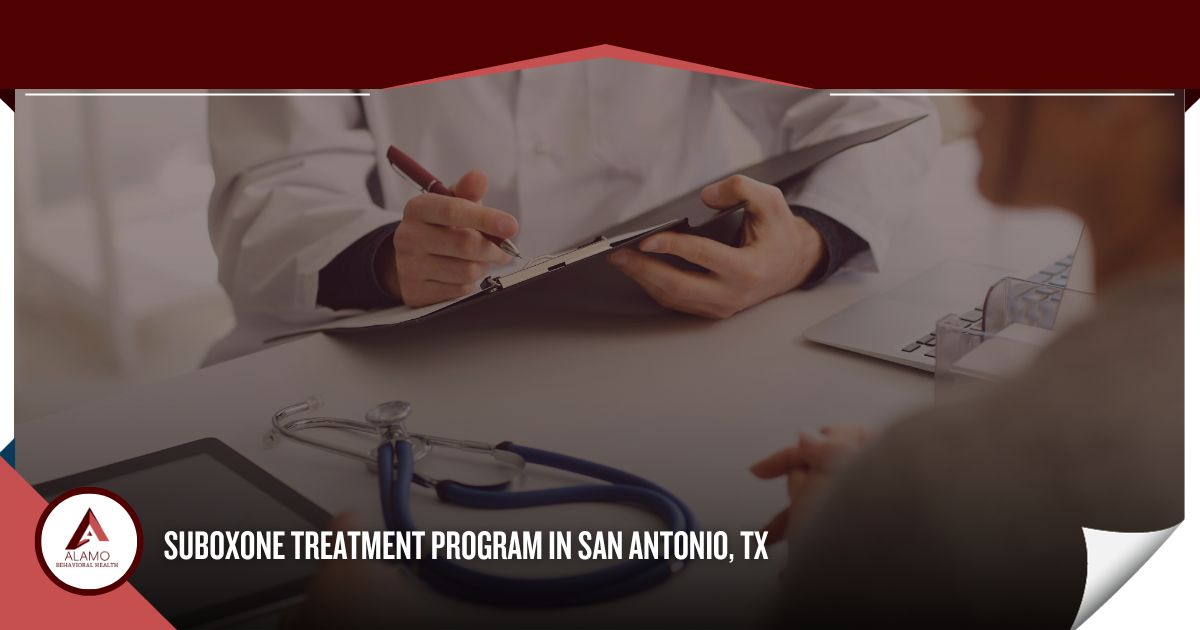 Beating opioid addiction can feel like an uphill battle, but with the help of medications like Suboxone and an individualized treatment program, anyone can achieve recovery. Certified Suboxone doctors, clinics, and treatment programs in San Antonio can prescribe Suboxone to treat individuals who are addicted to opioids. At Alamo Behavioral Health, our comprehensive medication-assisted treatment (MAT) program combines medication therapy with individualized counseling and behavioral therapy, providing a whole-person approach to recovery.
Beating opioid addiction can feel like an uphill battle, but with the help of medications like Suboxone and an individualized treatment program, anyone can achieve recovery. Certified Suboxone doctors, clinics, and treatment programs in San Antonio can prescribe Suboxone to treat individuals who are addicted to opioids. At Alamo Behavioral Health, our comprehensive medication-assisted treatment (MAT) program combines medication therapy with individualized counseling and behavioral therapy, providing a whole-person approach to recovery.
What is Suboxone?

Suboxone is a brand-name prescription medication that is used to treat opioid use disorder. It was approved by the U.S. Food and Drug Administration (FDA) in October 2002.
Suboxone is a combination medication that contains two active ingredients: buprenorphine and naloxone. The medication comes in the form of a sublingual pill or film that is designed to be placed under the tongue and dissolved then absorbed into the bloodstream.
Common side effects of Suboxone include:
- Nausea
- Headache
- Insomnia
- Sweating
- Constipation
- Dizziness
- Drowsiness
- Blurred vision
- Irritability
- Anxiety
- Stomach pain
- Back pain
- Withdrawal symptoms if stopped abruptly
- Respiratory issues in rare cases
Suboxone treatment programs in San Antonio closely monitor clients’ Suboxone use to mitigate any side effects and address any concerns that may arise throughout the treatment process.
How Does Suboxone Work?
When prescribed, Suboxone can alleviate symptoms of opioid withdrawal and reduce the severity of cravings in people who are recovering from opioid dependence.
Buprenorphine is a partial opioid agonist, meaning it attaches to the same receptors in the brain as opioids but activates them less strongly. This means it can satisfy cravings without causing the same intense high as stronger opioids like heroin or oxycodone.
By binding to these receptors, buprenorphine helps to alleviate withdrawal symptoms, reducing the discomfort often experienced when someone stops using opioids. Buprenorphine has a longer duration of action than shorter-acting opioids, which means it can help prevent cravings and withdrawal symptoms for an extended period, usually for about 24 to 36 hours.
Naloxone, on the other hand, is an opioid antagonist that is added to Suboxone to deter misuse. Naloxone is the active ingredient in Narcan, an opioid overdose reversal medication that works by reversing the effects of opioids. However, when taken as directed (under the tongue), naloxone has limited effects because it’s not well absorbed in the digestive system. If someone tries to inject Suboxone to get high, the naloxone can trigger immediate withdrawal symptoms because it knocks opioids off of opioid receptors in the body.
The combination of buprenorphine and naloxone helps to reduce cravings and withdrawal symptoms, making it easier for individuals to transition away from stronger opioids.
It’s important to note that Suboxone is most effective when it is used as part of a comprehensive treatment plan for opioid addiction known as medication-assisted treatment (MAT). It’s often prescribed along with counseling and behavioral therapies to support individuals in their recovery journey.
What to Expect at a Suboxone Treatment Program in San Antonio
A common misconception about Suboxone is that the medication simply replaces one drug with another. However, Suboxone treatment is an evidence-based, clinically-proven approach to opioid addiction treatment, and there is a lot more that goes into treatment than simply taking medication.
Assessment
Suboxone treatment programs in San Antonio begin with a thorough assessment. You can expect questions about your substance use, physical health, mental health, and treatment goals. This evaluation helps healthcare professionals understand your unique situation, including the history of opioid use, medical conditions, and any other relevant factors and lays the groundwork for creating a personalized treatment plan tailored to your needs.
Medication Management
Once assessed, clients may begin taking Suboxone and participating in medication management. This involves the safe administration and close monitoring of Suboxone to alleviate withdrawal symptoms, reduce cravings, and support your transition away from stronger opioids. The medical team will determine the appropriate dosage and closely monitor your response to the medication, adjusting it as necessary to ensure optimal effectiveness of the medication.
Counseling
In addition to medication, counseling is a fundamental component of Suboxone treatment. Counseling sessions provide a supportive environment to address the psychological aspects of addiction. Individual and group therapy sessions offer opportunities to explore triggers, develop coping strategies, and learn valuable life skills to support long-term recovery.
Types of therapy that may be used at a Suboxone treatment program in San Antonio include:
- Cognitive behavioral therapy (CBT)
- Dialectical behavioral therapy (DBT)
- Motivational interviewing (MI)
- Contingency management (CM)
- Family behavior therapy
- Relapse prevention therapy
- Trauma therapy
Peer Support
Suboxone treatment programs encourage clients to develop strong peer support systems. Engaging with others who are on a similar recovery journey can provide encouragement, inspiration, and a sense of camaraderie. Group therapy sessions or peer support groups allow individuals to share experiences, offer mutual support, and learn from one another’s successes and challenges. This sense of community can significantly contribute to maintaining motivation and fostering a supportive network during and after treatment.
Aftercare
Transitioning out of a treatment program doesn’t mark the end of your recovery. Aftercare plays a crucial role in maintaining long-term recovery.
Post-treatment plans often involve ongoing support services, such as continued counseling, support groups, and regular check-ins with healthcare providers. These services help individuals navigate challenges that arise, reinforce coping mechanisms learned in rehab, and sustain the progress made during treatment, promoting continued abstinence.
San Antonio Suboxone Treatment With Alamo Behavioral Health
Suboxone may not be right for everyone, but at Alamo Behavioral Health, our team can assess your needs and help you choose the right treatment program for you. Whether you’re interested in medically-assisted treatment in San Antonio or would like to discuss your other options, please contact us today to get started with a confidential, risk-free assessment.



